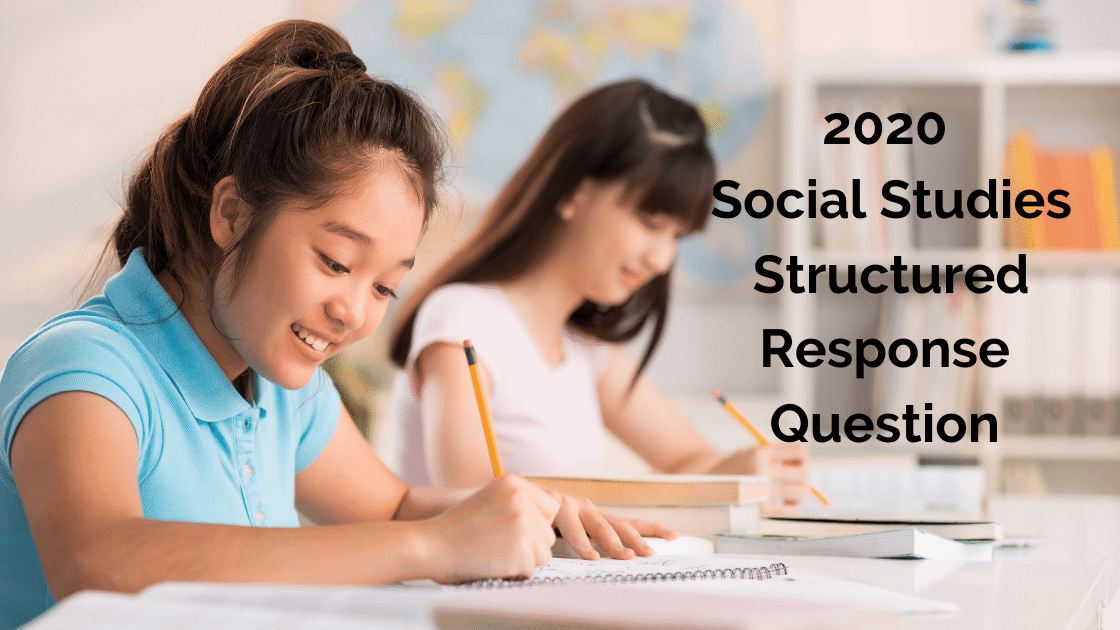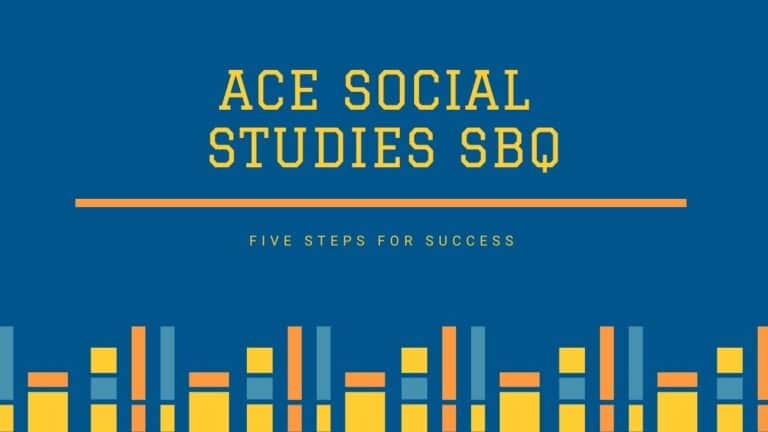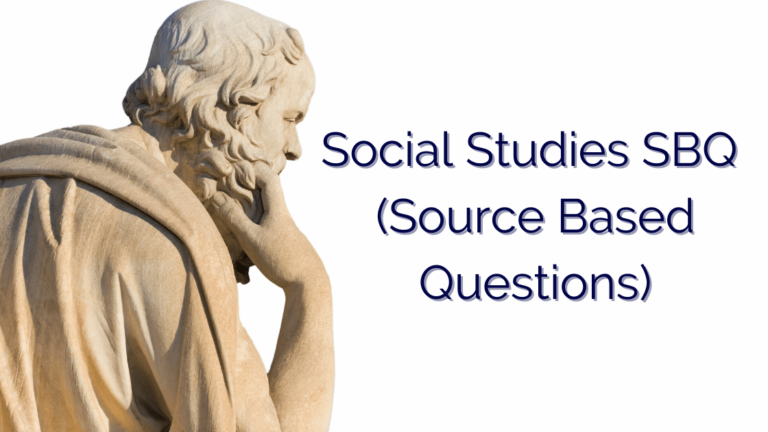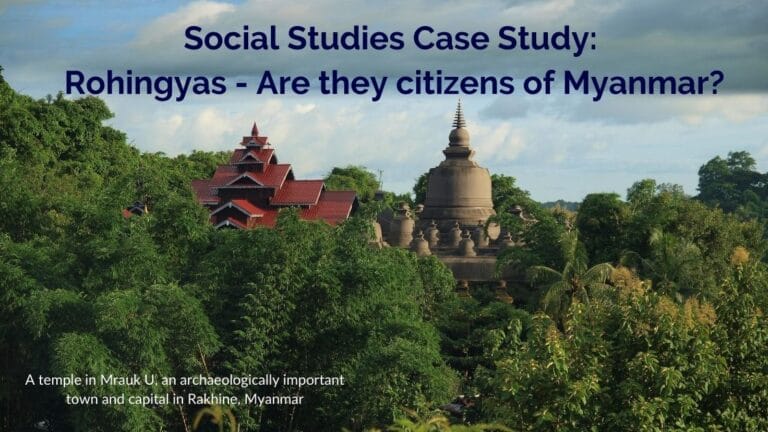How to Ace Social Studies SRQ (Structured Response Question)
How can a student ace the Social Studies SRQ (Structured Response Question? There are two parts to this question as Social Studies SRQ have two different types of questions.
The first type of question requires general knowledge and structured brainstorming while the second type requires studying. I will be discussing both types in this article.
Social Studies SRQ (a)
Question (a) of the Social Studies paper has one extract and asks students to brainstorm a possible strategy or solution for a problem. While the topic is related to the issues studied in the textbook, the solutions might not be mentioned or only mentioned in passing.
Hence, some Social Studies teachers believe that it is not necessary for students to master the content to answer this question. Let us use the 2020 O Level Social Studies paper as an example.
In the 2020 paper, Extract 1 is a chart that shows most plastic waste is not recycled. In addition, out of the waste that is not recycled, 20% are plastic bags.
The question requires students to state what messages they would share on how to reduce the amount of plastic waste generated.
Suggested Answer
(Point) One message I can share to reduce plastic waste would be to bring your own bags when you go grocery shopping
(Example) Plastic bags compromise the largest section of not recycled plastic. Many people get plastic bags when they go grocery shopping. However, many of these plastic bags go to waste as the supermarkets are very generous in giving out plastic bags.
(Evidence) If Singaporeans can reduce the use of plastic bags, they would naturally reduce the number of plastic bags that go unrecycled. Singaporeans can bring their own reusable bags or even their backpacks to pack their groceries.
(Link) When more people switch over to reusable bags, it reduces plastic waste.
(Point) Another message I would share is to reuse plastic bags if you happen to get them.
(Explain) Sometimes it is not so easy to bring your own bag. It could be a last-minute grocery trip, or you happen to need to buy items when you are out doing other errands. That is why if we have plastic bags, we should try to reuse them.
(Evidence) Many Singaporeans already reuse plastic bags to some extent by using them as bin liners. This is not enough. Why don’t we all bring some plastic bags with us all the time? It can be in our bags or even in our wallets. This way, we always use them when we need to carry some item.
(Link) In conclusion, by reusing plastic bags, we will help to reduce plastic waste.
As you can see, answering the 2020 Social Studies SRQ did not require in-depth knowledge of the content. Any student who has paid attention to the news would have no problems answering this question.
Social Studies SRQ (b)
The second sub-question has two extracts and lists two related factors that students have to evaluate. Students might need to evaluate and argue which factor is more challenging, impactful or important.
Many of the factors given are found in the textbook. However, it may not be straightforward. For example, the textbook may only explain why they are essential while the question may ask students which factor is harder to implement.
To help students with the Social Studies SRQ (b), I have included sample Structured Response Questions for students to refer to. They will be in another blog post and the links will be found at the end of the article. There is a lot of content and I do not wish to overwhelm students or parents reading this.
While they may not exactly fit the question asked in an examination, the samples are a good starting point for students.
I have also included a sample answer to the 2020 O Levels Social Studies Structured Response Question here to help parents understand the samples better.
2020 Social Studies Structred Response Question (b)
(Point) Managing competing needs and interests can be extremely challenging for governments.
(Explain) This can be difficult because there are many groups in a country, each with different interests and priorities. In many cases, their interests and priorities conflict with each other and the government needs to evaluate how to accommodate the interests of both groups.
In many cases, there are limits to what the government can do to pacify one side. Ultimately governments may have to sacrifice one group as they are unable to please everybody.
(Evidence) For instance, hospices are important speciality healthcare facilities. They are used to house patients with terminal diseases. The patients require emotional, spiritual, and even physical comfort in the last stage of their lives. To them, being able to stay in a hospice is vital.
However, many residences do not like the idea of having a hospice built near them. They are superstitious and feel that hospices bring bad luck since most patients end up dying. They also feel that their property prices will decrease. Hence, they protest and complain to their MPs when they know a hospice is planned.
(Link) However, hospices are required. They also cannot be built in a place where there are no residences as it would make visits difficult. As a result, governments find it difficult to balance the needs of both sides.
(Point) On the other hand, strengthening citizen’s sense of belonging can also be challenging.
(Explain) It can be challenging especially for countries with a diverse mix of ethnic groups or religions. This is because a government needs to find something common to all these groups to anchor them. Many countries use a combination of education and participation in common activities to strengthen their sense of belonging. This is not easy if the cultures of the different groups are too wide to bridge.
(Evidence) This can be seen in the French example. France has allowed immigration from former French colonies. The new immigrants have a different culture and religion from the French. France has tried to build a sense of national identity by emphasizing secularism in school.
Hence, French schools do not touch on any religions except History and Philosophy classes. They believe these can help immigrants join French secular society. However, this has created tension as many immigrants still retain their religious identity.
(Link) Indeed, strengthening citizen’s sense of belonging is challenging.
(Judgement) In conclusion, I believe that managing competing needs and interests of citizens is more challenging than strengthening the sense of belonging for many governments.
One reason is that many governments have citizens that are homogeneous. This makes it easier for them. For governments that have different ethnic or cultural groups, most problems are due to adult immigrants. Most of them grew up in another country and thus still identify with their previous country or culture.
However, their children and the generations below would have no existing identity, making it easier to strengthen their belonging. On the other hand, competing needs and interests between groups can be impossible to manage as their needs contradict each other. As a result, there is no leeway for compromise. Hence, governments need to thread carefully to navigate these challenges.
As you can see from the above, the content needed is in the textbook. It is probably the only question that requires memorisation work.
Final Note
This post needs to be paired with the sample essays. You can find Issue 1 here.
For more information regarding Social Studies, you can find it here.

Critical Thought English & Humanities is your best resource for English, English Literature, Social Studies, Geography and History.
My experience, proven methodology and unique blend of technology will help your child ace their exams.
If you have any questions, please contact us!







